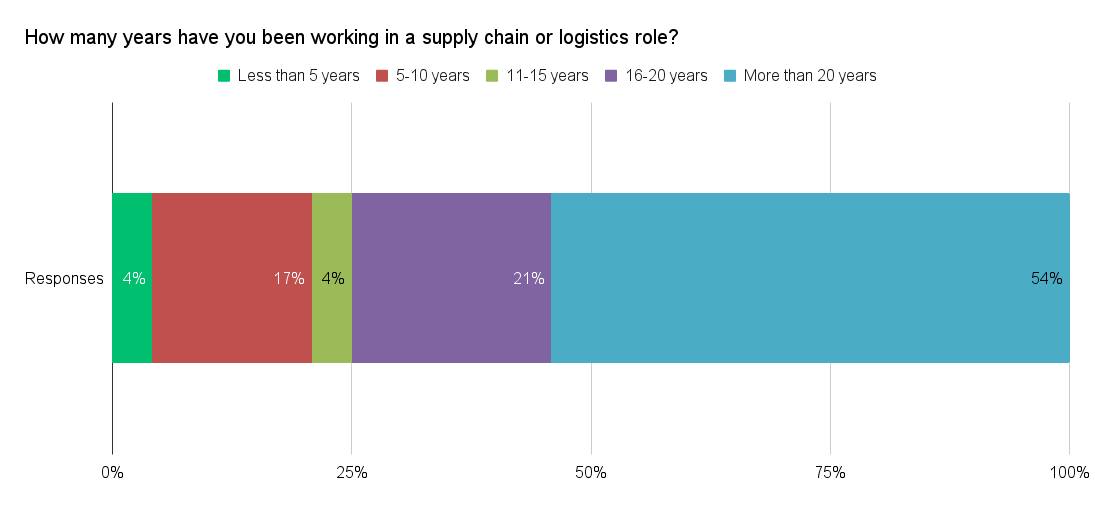A few weeks ago, we asked members of our Indago supply chain research community, “Based on your experience and lessons learned, what advice would you give to young professionals (or students) interested in a supply chain / logistics career? What will be important for them to succeed?”
“Logistics and Supply Chain expertise must be learned in the field, not out of a book,” said one executive. “Take your book learning and apprentice with a company where you can learn all segments of the supply chain, from procurement, to supply planning, to warehouse operations, to transportation management. If possible, many companies have training programs where they will rotate you through all these departments. Do your homework and find a good company that will develop you to promote into the organization.”
Another executive commented, “It’s a great field for growth and continuous learning. It’s important to get exposure and real-world experience to establish credibility. The practical nature of things is inherently more nuanced than what’s taught in the classroom. Seize opportunities to get involved in any aspect of the value chain. Supply chain is a large field and exposure/learning in any area will translate to further development. Get involved wherever you can!”
For reference, almost 75% of our Indago member respondents have 16 years or more of experience working in supply chain or logistics.

Here are some additional value-added comments from our Indago members, who are all supply chain and logistics professionals from manufacturing, retail, and distribution companies:
“It is a great industry that is really the backbone of many companies. It is very dynamic and always changing. Dealing with ambiguity is key. Analytics is critical and will become even more important. Knowledge in automation, artificial intelligence, advanced analytics and Lean methodologies will continue to be very important.”
“What you will experience in the ‘real’ supply chain world will likely be very different from the classroom. I found that the real world moved much faster, the undefined variables were much more numerous, and the problems much more complex. To succeed, you will need to become comfortable in very ambiguous situations. The ‘unknowns’ often outnumber the ‘knowns’ – [therefore], you will have to make (and document) many assumptions, choose a course of action, and be flexible and nimble enough to react and correct course as more information becomes available.”
“Understand all the functions within Supply Chain and how they interact. Things are changing rapidly and will continue to do so. Stay engaged in learning through networking, associations, continuous education, etc. It is ok to not have all the answers. Do not be afraid to ask questions.”
“Embrace the opportunity to spend time to learn and experience operations — [for example], work in a distribution center, a store, or help out on a delivery truck. There are aspects of the customer experience that you will miss just sitting behind a desk.”
“There are two things I stress with young professionals: First, get as much lateral experience as possible; every career move can’t be vertical (although many young professionals tend to think that way). Our industry is multi-faceted, and many areas change at a rapid pace. Anyone with a long view on reaching senior leadership levels needs to have a broad base of experience and skills. Second, be willing to stay in a role for longer than a year. It seems to me that too many of my younger colleagues expect to be doing something new and different every year. I tell them that they have a responsibility to perform in a role for some time after they are trained and up-to-speed. Nobody needs to stay in the same role for many years, of course, and if a young professional focuses on my first bit of advice, this can be a good way to avoid feeling ‘stuck’ in a particular role.”
Do you agree with the advice from our Indago members? What advice would you give supply chain young professionals? Post a comment and share your perspective!
Join Indago
If you’re a supply chain or logistics practitioner from a manufacturing, retail, or distribution company, I encourage you to learn more about Indago and join our research community. It is confidential, there is no cost to join and the time commitment is minimal (2-5 minutes per week) — plus your participation will help support charitable causes like JDRF, American Logistics Aid Network, American Cancer Society, Feeding America, and Make-A-Wish.
You can also follow us on LinkedIn to stay informed of our latest research results and news.


